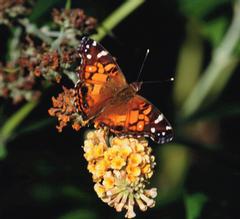
Overview
|
By working together on a grand scale we can conserve nature and
stop species extinctions. Our mission is to encourage citizen scientists
in nature based learning and discovery research. We plan for citizens to
establish a global network of ecological study sites and report their
findings via the Web. Eventually we hope schools and local community
groups will document and monitor all living things that we care about.
Thus, we can understand nature's ecological processes and requirements and
provide policy makers and land managers with knowledge needed to act wisely. Nature Days will involve teachers, students, parents, and others in discovery. These events are being organized by educators, scientists, land managers, and others under the umbrella of The Polistes Foundation. Their concept stems from the Smart, Wired & Alive Conference in Athens, Georgia; from Biodiversity Days in Massachusetts, which involved an estimated 30,000 citizens last year, and from the multi-state Nature Mapping program based in Seattle, Washington. Nature Days will build on this experience and use the Web to share study methods, help identify things, report findings, and coordinate activities worldwide. If you want to learn about the living things around you, experience the joy of discovery, share what you find, teach others, and help us gather data to conserve nature, please plan to join us in Nature Days. Everyone is welcome. We will officially launch Nature Days in May, 2002, in recognition of the beginning of IBOY's Biodiversity Month. Before then we need further to organize, build infrastructure, design research protocols, develop software tools, and test things. We will announce under the Events section of In planning Nature Days, our objectives are that:
During Nature Days this May, we will restrict data reporting to sites in North America and Mexico and to species that we have listed on-line (i. e., plants, butterflies, bumble bees, birds, and dragonflies). Citizens will set up study sites, learn to identify and collect data on at least 20 local species (8 plants, 8 birds, and 4 insects), and test the capacity of our Web servers and software. Initial research will focus on pollination, documenting species interactions, geographic distributions, seasonality and behavior of bees, butterflies and flowers. As our capacity grows, we will enable citizens to add sites worldwide and report observations on all species. You may pre-view the 20q software under development that will help citizens identify things and report their findings at http://pick4.pick.uga.edu/mp/20q. Detailed methods and organizational plans will be placed on this site soon. Cheers,
University of Georgia |
| Discover Life | All Living Things | IDnature guides | Events | Nature Days |